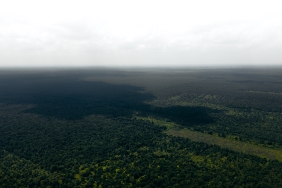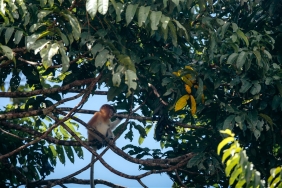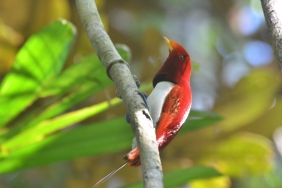INDIGENOUS PAPUANS HAVE NO RIGHT TO SELL TIMBER
Jakarta, April 03, 2018 - Around 90% of the land area of Papua Province is forest area (24,902,147 hectares-KLHK 2015). By the end of 2017, the Ministry of Environment and Forestry (MoEF) had issued forest management licenses covering 3.4 million hectares and industrial timber plantations covering 1.2 million hectares. However, not a single one has been granted to indigenous people in Papua.
When Special Autonomy was implemented in Papua, the provincial government had the authority to manage its own natural resources. The Special Autonomy Law calls for this to be regulated in special regional regulations (Perdasus). In Papua Province, several Perdasus have been established to regulate the management of these natural resources, one of which is the Papua Province Perdasus No. 21 of 2008 (Perdasus 21/2008) on sustainable forest management.
A decade after Perdasus 21/2008 was born, the utilization of timber forest products by customary law communities (known as IUPHHK-MHA) is still hampered by policies at the Ministry of Environment and Forestry. This model of utilization of timber forest products, which is considered more sustainable and in favor of indigenous peoples, is not recognized in the nomenclature of permits at the MoEF.
Aditya Bayunanda, Director of Policy, Sustainability and Transformation of WWF-Indonesia said, "To understand the issue of utilization of timber forest products by Indigenous Peoples (MHA), WWF together with Auriga, Elsam, and Jerat Papua conducted a study on timber utilization permits by MHA in Papua." The study, according to Aditya, revolves around the issue of IUPHHK-MHA as mentioned above and wants to offer a space for discussion to find a fair solution for all parties.
Syahrul Fitra, Auriga Researcher said, "Forest management with IUPHHK-MHA is the best choice for forest management in Papua. Because it is community-based, the rights granted will relatively prevent illegal logging. In fact, the community will help protect Papua's vast forests."
Indigenous communities are also quite serious about utilizing the rights granted and carrying out timber administration, even better than some HPHs in Papua. Of the 22 cooperatives owned by indigenous communities that have and are in the process of obtaining IUPHHK-MHA, some of them have taken care of the licensing administration process from the preparation of IHMB to the annual work plan. In fact, some of their members have received training as technical personnel (ganis) from the Forestry Service. "The government needs to seriously follow up on the deadlock experienced by these IUPHHK-MHA owners," Syahrul added.
The research was conducted in three IUPHHK-MHA locations spread across Jayapura and Sarmi districts. During the field research, the team conducted interviews and saw the IUPHHK-MHA locations directly.
Septer Manufandu, Director of Jerat Papua, said that the study released today was sourced from primary documents in the form of interviews and direct observations in the field, in addition to secondary documents. "We conducted interviews with three heads of KSU/Kopermas, and several members who accompanied during the process in the field, representatives of Bappeda Prov. Papua, the Papua Forestry Service, and community facilitators in the field," Septer said.
This study shows problems in the field related to the implementation of IUPHHK-MHA, as well as the recognition of indigenous peoples in Papua and their customary territories. The government's presence is needed because it has been a hanging problem for years. It needs to be realized that the situation on the ground shows that the community is dealing with rampant illegal logging activities in Papua.
In addition, the issue of forestry sectoral policies at the central level that have not been fully resolved, and the strong policy that sees forests only in terms of economic contribution, needs to be addressed immediately. This study recommends various things to both the central government and the Papua Provincial Government. In general, in its recommendations, the Coalition considers it necessary to integrate regional and central policies while still respecting the specificities of Papua Province.
--##--
For more information, contact:
- Joko Sarjito, FCMT Strategic Leader, WWF Indonesia
Email: jsarjito@wwf.id, Phone: +62 81347830331
- Dewi Satriani, Campaign and Mobilization Manager, WWF Indonesia
Email: dsatriani@wwf.id, HP: +62 811 910 970
- Syahrul Fitra, Auriga Nusantara Foundation
Email: syahrul@auriga.or.id, HP: +62 811 6611340





